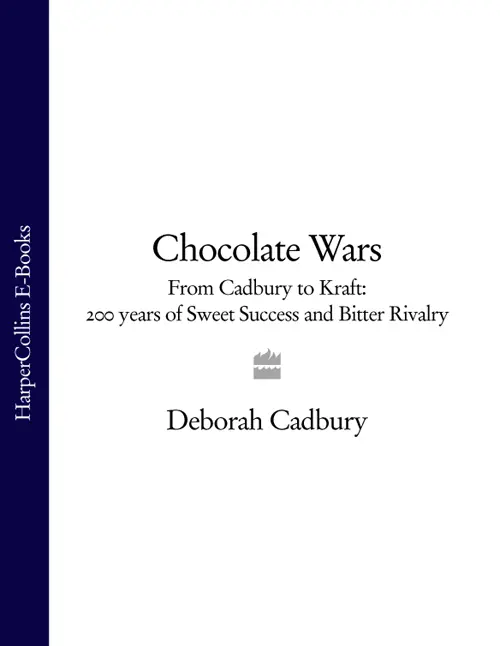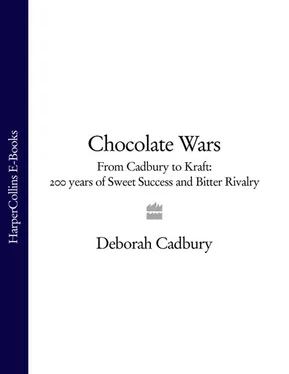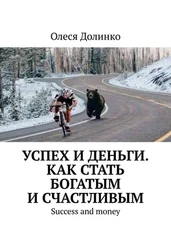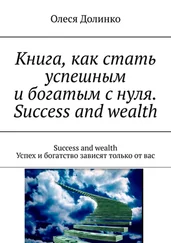
Chocolate Wars
From Cadbury to Kraft – 200 Years of
Sweet Success and Bitter Rivalry
DEBORAH CADBURY

To Pete and Jo, Martin and Julia, with love
Cover
Title Page Chocolate Wars From Cadbury to Kraft – 200 Years of Sweet Success and Bitter Rivalry DEBORAH CADBURY
Introduction
Part One
Chapter 1 - A Nation of Shopkeepers
Chapter 2 - Food of the Gods
Chapter 3 - The Root of All Evil
Chapter 4 - They Did Not Show Us Any Mercy
Chapter 5 - Absolutely Pure and Therefore Best
Part Two
Chapter 6 - Chocolate that Melts in the Mouth
Chapter 7 - Machinery Creates Wealth but Destroys Men
Chapter 8 - Money Seems to Disappear Like Magic
Chapter 9 - Chocolate Empires
Chapter 10 - I’ll Stake Everything on Chocolate
Part Three
Chapter 11 - Great Wealth is Not to be Desired
Chapter 12 - A Serpentine and Malevolent Cocoa Magnate
Chapter 13 - The Chocolate Man’s Utopia
Chapter 14 - That Monstrous Trade in Flesh and Blood
Chapter 15 - God Could Have Created Us Sinless
Part Four
Chapter 16 - I Pray for Snickers
Chapter 17 - The Quaker Voice Could Still be Heard
Chapter 18 - They’d Sell for 20p
Chapter 19 - Gone. And it was so Easy
Epilogue
Bibliography
Index
Acknowledgements
List of text illustrations
List of plates
About the Author
By The Same Author
Copyright
About the Publisher
Introduction
When I was a young child, the knowledge that a branch of my family had built a chocolate factory filled me with wonder. What sort of charmed life did such a possibility offer to my relatives? Each Christmas I had an insight when the most enormous case arrived from my uncle, Michael Cadbury, containing a large supply of mouth-watering chocolates. Even more memorable was the trip I made in the early 1960s to see how the chocolate was made. As I opened the door to the factory at Bournville in Birmingham, the sight that greeted me was magical.
To my child’s eyes it was as though I had entered a cavernous interior that belonged to some benign, orderly and highly productive wizard who had somehow saturated the very air with a chocolate aroma. My uncle and parents raised their voices against the whirr of machinery. But I did not hear them. All I could see was chocolate. It was all around me, in every stage of the manufacturing process. There was molten chocolate bubbling in vats towering above me, vats so huge that they had ladders running up their sides. Chocolate rivers flowed on a number of swiftly-moving conveyers through gaps in the wall to mysterious chambers beyond. Solid chocolate shaped in a myriad of exciting confections travelled in neat, soldierly processions towards the wrapping department. Such a miracle of clockwork precision and sensual extravagance was hard to take in. Even more puzzling to my young mind was the question of how this chocolate feast, which brought the idea of greed to a whole new level, fitted with religion? For even though I did not yet understand the connection, I did know that the chocolate works were, in some inexplicable way, intimately connected with a religious movement known as Quakerism. Was all this the hand of God?
My own father had left the Quakers just before the Second World War. He wanted, as he put it, to ‘join the fight against Hitler’, a stance that was not compatible with Quaker pacifism. I was brought up in the Church of England, and as a child, when I joined my cousins for Quaker meetings, I felt as if I were on the outside looking in on a strange, even mystical tradition. Long silences endured in bare rooms, stripped of anything that might excite the senses, where grownups contemplated the surrounding void, were incomprehensible to me. Equally incomprehensible: how did my rich, chocolate relatives acquire that admirable restraint, that air of wholesome frugality? Even family picnics had a way of turning into long and chilly route marches, raindrops trickling down my back. The wealth and the austerity seemed oddly incongruous. Did the one contribute to the other? Cheerful homilies from my father along the lines of ‘Many a mickle makes a muckle’ and ‘Look after the pennies and the pounds will look after themselves’ did not supply a satisfactory answer. Even a five-year-old knew this was not the key to creating a chocolate factory.
A generation passed before I decided to retrace my steps up Bournville Lane. This time it was personal. I wanted to delve into the Bournville and family archives to uncover the whole story. When I turned the corner in the lane in the autumn of 2007, my heart skipped a beat as I was taken back to that day when my father and uncle, both now much missed, had taken me round the factory. To my surprise, the chocolate works seemed even larger than I remembered. Imposing red-brick blocks stood beside the neatly mowed cricket pitch, with Bournville village and green nestled behind. At this time, Cadbury was the largest confectioner in the world, and the only independent British chocolate enterprise to survive from the nineteenth century. I wanted to understand the journey that took my deeply religious Quaker forebears from peddling tins of cocoa from a pony and trap around Birmingham to this mighty company that reached around the globe.
The story began five generations ago, when the far-sighted Richard Tapper Cadbury, a draper in Birmingham in the early nineteenth century, sent his youngest son, John, to London to study a new tropical commodity that was attracting interest among the colonial brokers of Mincing Lane: cocoa. Was it something to eat or drink? Richard Tapper saw it pre-eminently as a nutritious non-alcoholic drink in a world that relied on gin to wash away its troubles. Never could my abstemiously inclined ancestor have guessed what fortunes would be entwined with the humble cocoa bean, although it seemed full of promise, a touch of the exotic.
His grandsons, George and Richard Cadbury, turned a struggling business into a chocolate empire in one generation. In the process, they found themselves in competition with their Quaker friends and rivals Joseph Rowntree in York, and Francis Fry and his nephew Joseph in Bristol. The Cadbury, Fry and Rowntree dynasties were built on values that form a striking contrast with business ethics today. Their approach to the creation of wealth was governed by a code of practice developed over hundreds of years since the English Civil War by their Quaker elders and set out at yearly meetings and in Quaker books of discipline. This nineteenth-century ‘Quaker capitalism’ was far removed from the excesses of the world’s recent financial crisis, with business leaders apparently seeing no harm in pocketing huge personal profits while their companies collapsed.
For the Quaker capitalists of the nineteenth century, the idea that wealth-creation was for personal gain only would have been offensive. Wealth-creation was for the benefit of the workers, the local community and society at large, as well as for the entrepreneurs themselves. Reckless or irresponsible debt was also seen as shameful. Quaker directives ensured that no man should ‘launch into trading and worldly business beyond what they can manage honourably . . . so that they can keep their words with all men’. Even advertising was dismissed as dishonest, mere ‘puffery’: the quality of the product mattered far more than the message. Men like Joseph Rowntree and George Cadbury built chocolate empires at the same time as writing ground-breaking papers on poverty or studies of the Bible, or campaigning against a multitude of Dickensian human rights abuses. Puritanical hard work and sober austerity, with the senses kept in watchful restraint, were the guiding principles.
Читать дальше














